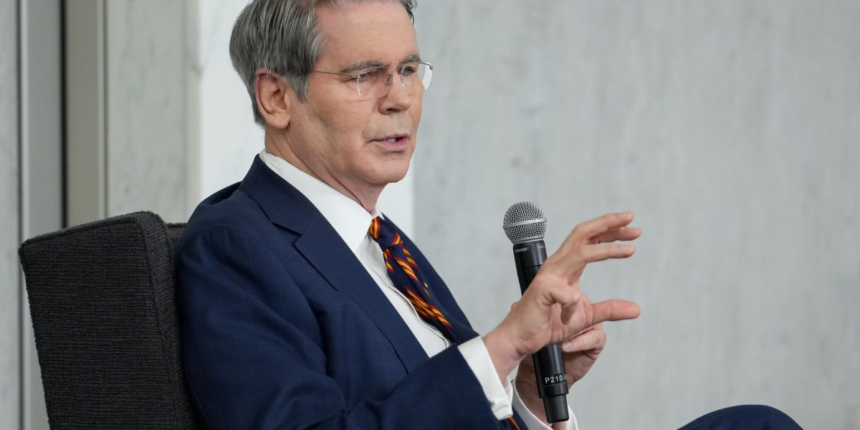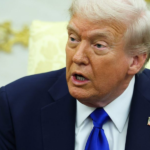For Scott Bessent’s $20 billion bet on Argentina to pay off, a lot of things have to go right – things that in the past, in Argentina, have tended to go wrong.
The Treasury secretary announced a lifeline Thursday that’s designed to pull the country’s financial markets out of deepening turmoil, and a close political ally out of a hole. The US is offering swap arrangements to shore up the peso — and it’s already stepped in directly to buy the currency, a move with few precedents in recent decades.
Argentina’s President Javier Milei — perhaps the Trump administration’s strongest backer in Latin America, where superpower rivalry with China is heating up — has vowed to leave all that bad history behind. He says he’s finally putting the country’s public finances in order and getting a grip on rampant inflation, even if it means taking a chainsaw to the budget.
Milei “is trying to break 100 years of bad cycles,” Bessent posted on social media Friday. “We do not want another failed or China-led state in Latin America.”
The essence of Bessent’s bet is that, with US financial muscle behind him, Milei can win them. And then, with a supportive congress, get his economic program on track and investors onside once again. Analysts say that’s not impossible, just hard.
“It’s a gamble that all the problems that Argentina now faces are a function of politics, that Milei can pull a rabbit out of the hat and do better than expected in the October elections,” says Brad Setser, a former Treasury official now at the Council on Foreign Relations.
But Setser sees problems with the country’s economic program that won’t go away even if that happens – adding more layers of risk to the US intervention. “It’s a bet that the peso is not structurally overvalued,” he says. “It’s a bet that the band can hold.”
In the past week-and-a-half or so, Argentina’s Treasury burned through $1.8 billion to prop up the currency and keep it within the band it’s supposed to trade in – and was reckoned to be running low on funds before Bessent stepped in. US intervention triggered a peso rebound as well as a surge in government bonds on Thursday. The country’s markets were closed Friday for a public holiday.
The case for Milei, which has driven healthy market returns for most of the last two years, is that his chainsaw has delivered. Argentina posted its first budget surpluses since 2009, and inflation is down to around 30% from peaks almost 10 times higher. That achievement is key for his pitch to voters.
But it’s underpinned by careful management of the peso, which kept the lid on import prices – while storing up strains.
Bessent told Fox News Thursday that he thinks the peso is undervalued. Most economists take the opposite view, saying the currency is too strong and hurting Argentina’s competitiveness. You don’t need economic theory to make that argument: the evidence is in plain sight at shopping malls across the border in Chile, where Argentine buyers have been on a spree thanks to the peso’s new purchasing power.
But not imminent. Any such move before elections would likely be disastrous for Milei. And US intervention means he doesn’t have to make it — yet.
The first Trump administration also considered intervening in Argentina to buy pesos, during a similar bout of turbulence, but ruled out the option amid a sense that it would be sending good money after bad, according to a person familiar with those discussions.
There’s a chance for Argentina now to put itself on a good economic track if Milei does well in the midterms, but everything has to go perfectly and the administration is essentially looking to keep markets in line until election day, the person said. If the Treasury’s SDRs are part of the deal then they’d most likely be used to repay some of the $55 billion that Argentina owes to the IMF, the person said.
That debt pile makes Argentina by far the Fund’s biggest borrower. It’s a legacy of IMF bailouts that have repeatedly turned sour – most dramatically in 2001, when a crash triggered massive civil unrest, and most recently in Trump’s first term, when then-President Mauricio Macri’s market-friendly reform program was collapsing.
While an assertive approach to China has bipartisan support in Washington, Bessent’s aid for Argentina has already been questioned on both sides of the aisle.
Bessent on Thursday called Argentina a country of “systemic importance,” without explaining what that consists of — and said helping Milei is fully compliant with America First. “I’ll tell you why,” he told Fox News’s Laura Ingraham late Thursday. “Do you want to be shooting at more gunboats like in Venezuela?”
That adds another layer to the whole gamble, says Setser at the Council on Foreign Relations. On top of all the other bets, he says, Bessent is making another one too: “A bet that the US political system will be comfortable putting money into Argentina, when the US government is shut down and not writing checks to Americans.”









